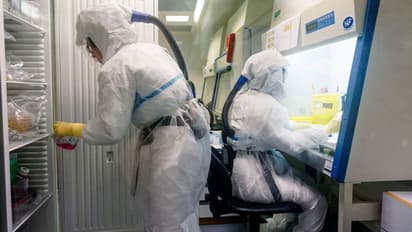Report says Wuhan lab has answers to Covid origin, claims US funded research

Synopsis
Nicholas Wade, a former Science and New York Times reporter, said that evidence adds up to a serious case that the virus was lab-grown.
Coronavirus pandemic, which has claimed over 3.4 million lives and affected countless more across the world in over a year-and-a-half, could have been created in a Chinese lab from which it then escaped, a noted science writer has said.
Nicholas Wade, a former Science and New York Times reporter, said that evidence adds up to a serious case that the virus was lab-grown.
In a detailed article in the Bulletin of the Atomic Scientists, Wade said that a Wuhan origin for the virus is a no-brainer for the lab escape scenario.
According to Wade, Wuhan is home to China's leading centre of Coronavirus research and that researchers there were genetically engineering bat coronaviruses to attack human cells under the minimal safety conditions of a BSL2 lab. He claimed that if a virus with the unexpected infectiousness of SARS2 had been generated there, its escape would be no surprise.
The coronavirus pandemic cases first emerged out of the Chinese city of Wuhan in December 2019. The commonly accepted justification is that the Covid virus arose through natural mutations, possibly at one of China's many 'wet markets', where caged animals are sold and slaughtered.
Wade, meanwhile, noted the lack of access to evidence from the Wuhan Institute of Virology or related labs in Wuhan.
He said, "The evidence adds up to a serious case that the SARS2 virus could have been created in a lab. But the case falls short of proof. Evidence from the Wuhan Institute of Virology, or related labs in Wuhan, that SARS2 or a predecessor virus was under development there. For lack of access to such records, another approach is to take certain salient facts about the SARS2 virus and ask how well each is explained by the two rival scenarios of origin."
"In all of China, the pandemic broke out on the doorstep of the Wuhan institute. The virus was already well adapted to humans, as expected for a virus grown in humanized mice. It possessed an unusual enhancement, a furin cleavage site, which is not possessed by any other known SARS-related beta-coronavirus, and this site included a double arginine codon also unknown among beta-coronaviruses. What more evidence could you want, aside from the presently unobtainable lab records documenting SARS2's creation," he wrote.
This is not the first time that such a view has emerged with regard to the origins of Coronavirus.
This theory found resonance in the Indian Parliament, where BJP MP Rajeev Chandrasekhar had in September 2020, flagged off the involvement of the Wuhan lab in triggering the pandemic.
The American role in Wuhan lab's work on Coronavirus?
Former US President Donald Trump had been of the firm view that the virus originated in a Chinese lab. More recently, on May 19, the US Centers for Disease Control and Prevention Director Dr Rochelle Walensky said the lab theory was certainly a possibility.
Interestingly, Wade pointed out the US role in funding the Wuhan Institute of Virology.
Wade claims that From June 2014 to May 2019, Dr Peter Daszak -- president of US-based organization EcoHealth Alliance that conducts research and outreach programs on global health -- had a grant from the US National Institutes of Health's National Institute of Allergy and Infectious Diseases to do gain-of-function research on coronaviruses at the Wuhan Institute of Virology.
"Whether or not SARS2 is the product of that research, it seems a questionable policy to farm out high-risk research to unsafe foreign labs using minimal safety precautions. And if the SARS2 virus did indeed escape from the Wuhan institute, then the NIH will find itself in the terrible position of having funded a disastrous experiment that led to the death of more than 3 million worldwide, including more than half a million of its own citizens," he wrote.
"The responsibility of the NIAID and NIH is even more acute because, for the first three years of the grant to EcoHealth Alliance, there was a moratorium on funding gain-of-function research. Why didn't the two agencies, therefore, halt the Federal funding as apparently required to do so by law? Because someone wrote a loophole into the moratorium. The moratorium specifically barred funding any gain-of-function research that increased the pathogenicity of the flu, MERS or SARS viruses," he further claimed.
Whatever the considerations, the bottom line is that the National Institutes of Health was supporting gain-of-function research, and the prudence of this decision can be questioned, whether or not SARS2 and the death of 3 million people was the result of it.
This article originally appeared in the Bulletin of the Atomic Scientists. Read the full story here
Check the Breaking News Today and Latest News from across India and around the world. Stay updated with the latest World News and global developments from politics to economy and current affairs. Get in-depth coverage of China News, Europe News, Pakistan News, and South Asia News, along with top headlines from the UK and US. Follow expert analysis, international trends, and breaking updates from around the globe. Download the Asianet News Official App from the Android Play Store and iPhone App Store for accurate and timely news updates anytime, anywhere.